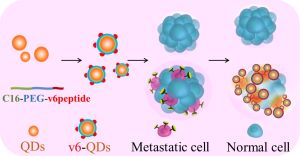The CD44v6 protein plays an important role in the metastatic spread of tumors. Researchers of Karlsruhe Institute of Technology (KIT) have now discovered a possibility to track CD44v6-expressing cancer cells using fluorescent nanocrystals with v6 peptides. They present their work in Advanced Science (DOI: 10.1002/advs.201600202).
The danger associated with a cancerous disease depends essentially on the tumor cells’ capability of forming metastases, i.e. on their spread and settlement in other organs. Due to their rapid metastatic spread, tumors of the pancreas are among the most aggressive types of cancer. Frequently, they can be diagnosed only when other organs have already been affected. Early detection and mitigation of metastases therefore are major goals of cancer research.
The CD44v6 protein discovered by KIT plays an important role in metastatic spread. Last year, scientists of KIT, in cooperation with amcure GmbH, used pancreas cancer models, conducted preclinical studies on animals, and found that CD44v6 on the cell membrane acts as a co-receptor of signal molecules that activate certain enzymes, so-called tyrosine kinases, such as MET or VEGFR-2. These enzymes decisively influence the activities of tumor cells: MET pushes their reproduction, migration, and invasion. VEGFR-2 supports angiogenesis, i.e. the growth of blood vessels needed for the supply of the tumor. Hence, MET and VEGFR-2 are decisive factors for the growth and spread of cancer cells.
To track the cancer cells expressing CD44v6, the group “Biofunctional Materials” under the direction of Dr. Pavel Levkin of the Institute of Toxicology and Genetics (ITG) and the Institute of Organic Chemistry (IOC), in cooperation with Professor Véronique Orian-Rousseau, ITG, applied v6 peptides - small sections of CD 44v6 consisting of five amino acids - in modified form. The scientists use fluorescent quantum dots – nanocrystals of extremely small diameter - and modified or functionalized them at the surface by v6 peptides to track the cancer cells. The fluorescent quantum dots specifically bind to CD44v6-expressing cells and color them. This worked in cell cultures and tumor tissues. “These structures, hence, have a high potential for the development and improvement of nanotransporters for diagnosis,” Dr. Pavel Levkin explains.
L. Li, M. Schmitt, A. Matzke, P. Wadhwani, V. Orian-Rousseau, P.A. Levkin: v6-peptide functionalized quantum dot nanoparticles selectively bind CD44v6 expressing cancer cells. Advanced Science, 2016. http://onlinelibrary.wiley.com/doi/10.1002/advs.201600202/full
More on CD 44v6 research at KIT:
https://www.kit.edu/kit/english/pi_2015_130_pancreatic-cancer-cd44-protein-induces-metastases.php
https://www.kit.edu/kit/english/pi_2014_15435.php
https://www.kit.edu/kit/english/pi_2012_11047.php
Being “The Research University in the Helmholtz Association”, KIT creates and imparts knowledge for the society and the environment. It is the objective to make significant contributions to the global challenges in the fields of energy, mobility, and information. For this, about 10,000 employees cooperate in a broad range of disciplines in natural sciences, engineering sciences, economics, and the humanities and social sciences. KIT prepares its 22,800 students for responsible tasks in society, industry, and science by offering research-based study programs. Innovation efforts at KIT build a bridge between important scientific findings and their application for the benefit of society, economic prosperity, and the preservation of our natural basis of life. KIT is one of the German universities of excellence.

